MARTECH FOR HUMANITY
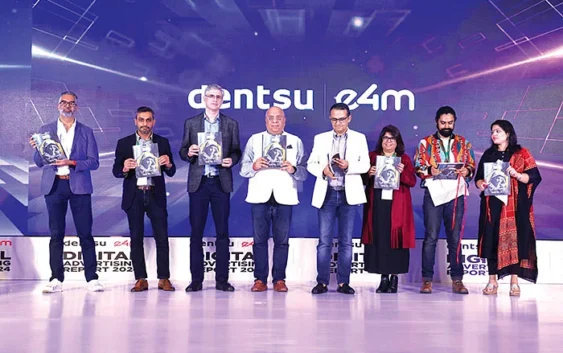
The dentsu-e4m Digital Advertising Report 2024 was unveiled on February 8, 2024 by exchange4media Group. The report’s theme is “A Small Step for Humanity, a Giant Leap for Marketing”. It covers topics such as:
The potential benefits of AI in marketing –
- The influence of AI on attention dynamics
- Changing trends in India
The delegates understood how to work together to navigate this confluence, resulted in a socially responsible and future-ready marketing environment in which creativity, empathy, and technology intersect to form meaningful connections.

The dentsu-e4m Digital Advertising Report 2024 investigated trends and media spending in the Indian advertising ecosystem, highlighting the potential advantages and innovative elements of AI in marketing, the influence on ROI, transitional problems, data governance, and more.
The digital advertising landscape is dynamic, with quick technology improvements. In today’s digital world, advertisers must remain nimble and continually review their strategy in order to stay ahead of the competition. With shifting consumer behaviours and growing technology, advertisers are increasingly adopting new inventive ad formats that contribute to the ever-changing nature of digital advertising.
Additionally, the growing integration of artificial intelligence, machine learning, and data analytics adds to the dynamism, allowing marketers to optimise targeting and personalise content in real time. The research acts as a guide, offering an overview of the future of digital advertising, significant industry trends, and valuable insights that may assist firms in optimising their marketing efforts.
The schedule was jam-packed with inspiring and thought-provoking talks from prominent marketing and media executives. The event was powered by Jio Cinema and Dangle Ads, with LinkedIn and Teads serving as Gold Partners and Mobavenue as a Growth Partner.
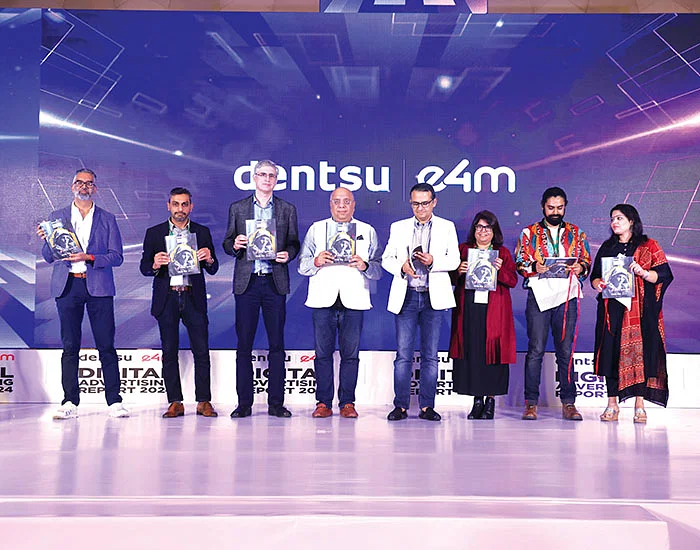
The dentsu-e4m Digital Advertising Report 2024 was unveiled by Harsha Razdan, CEO – South Asia, dentsu; Narayan Devanathan, Group Chief Strategic Advisor, dentsu India; Amit Wadhwa, Chief Executive Officer, Dentsu Creative India; Dr Annurag Batra, Chairman and Editor-in-Chief, BW Businessworld and Founder, exchange4media, Nawal Ahuja, Co-Founder, exchange4media; Anita Kotwani, CEO Media South Asia- dentsu India; Anubhav Sonthalia, CEO, Merkle India; Santosh Gannavarapu, Chief Growth Officer, Merkle India; Abheek Biswas, AVP Consumer Insights, Dentsu Creative India and Naziya Alvi Rahman, Editor, e4m.
“A Small Step for Humanity, a Giant Leap for Marketing.” This topic represents the harmonious interaction between human advancement and technology innovation in the dynamic field of marketing.
The dentsu-e4m Digital Advertising Report 2024 dives closely into the possibilities of Generative AI for consumers, brands, firms that generate them, and agencies that assist in selling them.
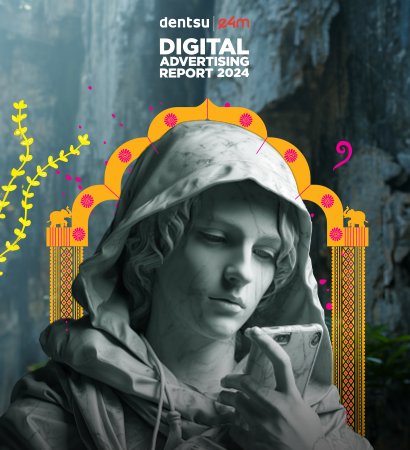
The Dentsu e4m Digital Advertising Report 2024, an annual benchmark in industry reporting, notes that Indian digital advertising had a hugely successful year in 2023, outpacing other segments, including traditional media heavyweight TV, for the first time, accounting for 44% of the total Indian advertising industry, a figure that is expected to rise to 55% by the end of 2025.
According to Nawal Ahuja, Co-founder, exchange4media, “The competitive nature of the digital advertising space necessitates a proactive approach with a keen eye for market shifts…. Digital media spends have seen a remarkable surge in recent years, reflecting a massive shift in advertising strategies.”
And now, with the introduction of Artificial Intelligence technologies, particularly Generative AI, the digital advertising and marketing sector has the perfect accelerant to attain that kind of development.
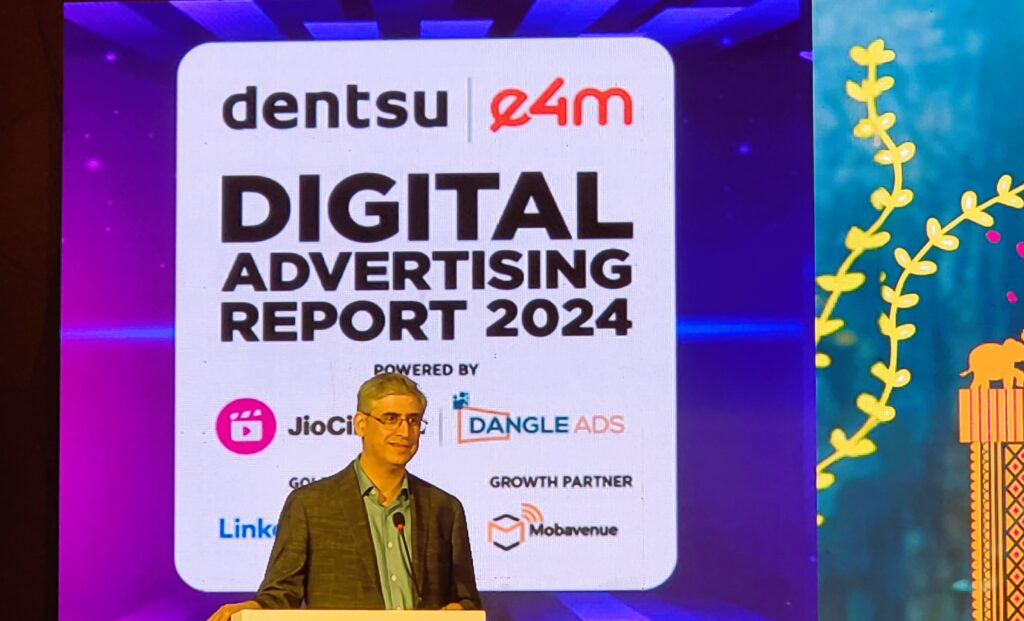
Harsha Razdan, CEO, South Asia, Dentsu, points out, “The transformative power of AI goes beyond rewriting rules, it propels us into a new era. It enables us the seamless integration of sustainability and innovation, challenging us to create solutions that transcends profitability. Our goal is no longer purely financial; it’s about navigating the path with responsibility and ethics, contributing meaningfully to a future where success aligns with societal wellbeing.”
As a result, the research looks deeply into the possibilities of Generative AI for consumers, brands, the corporations that generate them, and the agencies that help market them, as well as its already pervasive presence in our daily lives.
The research includes contributions from industry players from the creative and commercial sides, as well as auxiliary industries such as CTV, AR/VR, Programmatic, and others, all of which are expected to become inextricably linked with AI.

This paper analyzed how the contemporary renaissance, driven by technological and AI developments, is profoundly transforming the business and marketing environment, setting the road for long-term success and, eventually, uplifting mankind as a whole.
The Indian advertising sector is experiencing a digital transformation, and the Dentsu E4M Digital Advertising Report 2024 provided a positive image of the future. The research delved deeper into the India’s thriving advertising scene, examining trends such as digital domination, growing channels, altering consumer preferences, and the influence of artificial intelligence on marketing, with an emphasis on data-driven insights and ethical practices.
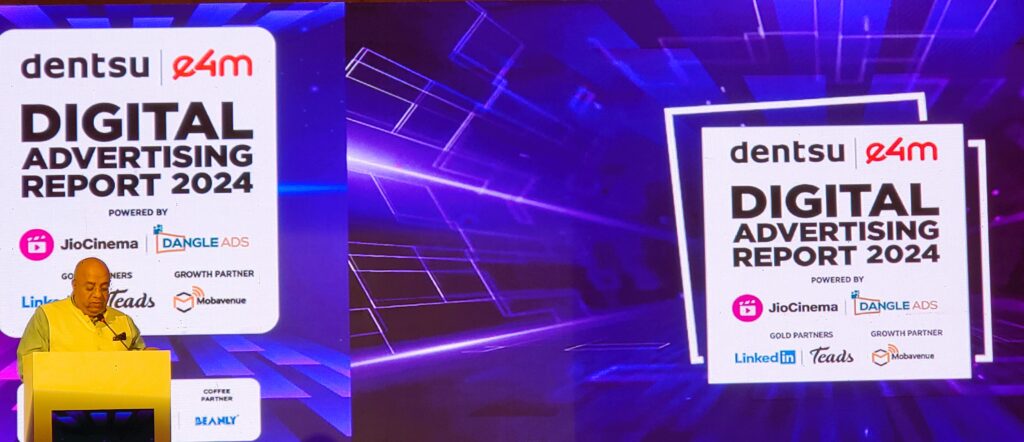
As Dr Annurag Batra, Chairman and Editor-in-Chief BW Businessworld and Founder, exchange4media, notes, the report “captures the essence of a modern media renaissance, where the convergence of technology and human creativity is at the epicenter… AI-powered solutions are not just reshaping business models but are also enhancing customer experiences across sectors.”
According to the report, the digital advertising industry in India is estimated to reach Rs 62,045 crore, growing at a CAGR of 23.49% by 2025.

“The Indian advertising industry grew 8.6% over 2022 and presently holds a market size of Rs 93,166 crore. By the end of 2025, it is expected to further grow at a compounded rate of 9.86% to reach Rs 1,12,453 crore. The digital advertising industry witnessed an impressive growth of 36.6% over 2022 with a market size of Rs 40,685 crore and is estimated to reach Rs 62,045 crore, growing at a compounded rate of 23.49% by 2025”, the report stated.
In the Indian advertising market, FMCG leads with a 34% share (Rs 31,428 crore), followed by e-commerce (14%), consumer durables (6%), and automotive sectors (6%). Tourism, Government and real estate saw significant growth too in terms of ad spends over the previous year.

Significant developments in digital infrastructure, connectivity, and user applications have fueled the expansion of India’s advertising industry. The Indian advertising sector expanded by 8.6% in 2023 and is anticipated to rise by 9% to Rs 1,01,591 crore by the end of 2024. The higher development trend has been linked to important events this year, including the Assembly and Lok Sabha elections, the IPL, other cricket and sports events, and India’s festive season.
According to the survey, ad spending is expected to increase further in 2024 in areas such as automotives, FMCG, government and social organisations, and travel and tourism.

Continuing its quick expansion, digital media is likely to sustain its outstanding growth trajectory, with a 25% rise projected to reach 50% of the Indian advertising industry by 2024. Furthermore, digital media is expected to increase at a compounded pace of 23.49% by 2025, with a spending share of 55%.
With digital media playing an increasingly important part in the growth of the Indian advertising business, TV ad spending are expected to fall from 32% to 28% by the end of 2024. Furthermore, a negative compounded increase of 2.05% is predicted, resulting in a 25% expenditure share by the end of 2025.
Despite TV’s diminishing market share, marketers see it as a stable platform for brands, with significant impact and efficacy in advertising and the potential to improve the performance of other media channels, according to the research.
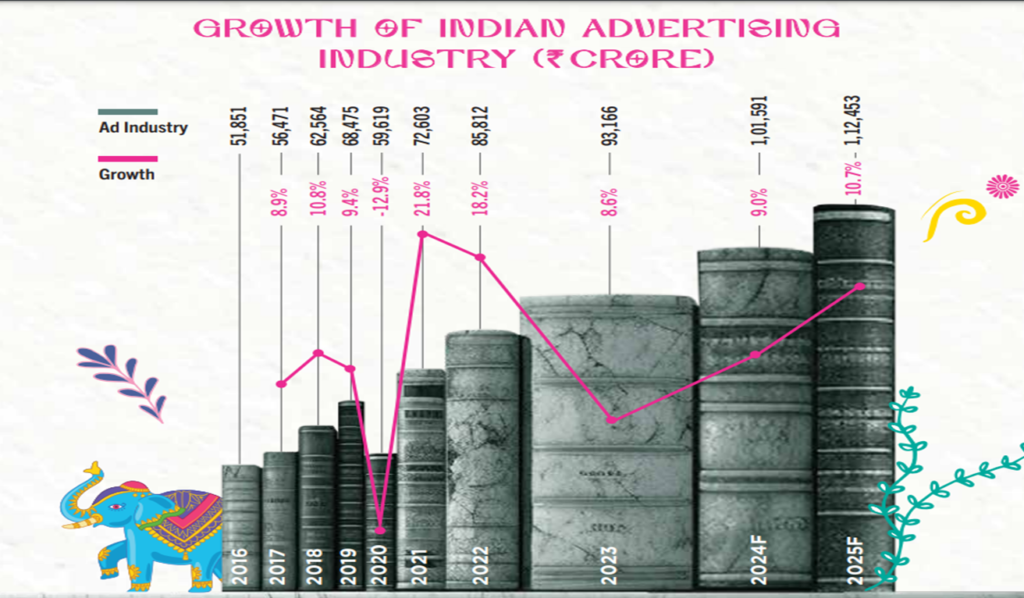
The Indian digital advertising industry concluded the year 2023 with a market size of Rs 40,685 crore, marking a notable growth rate of 36.6% over 2022. Owing to global economic trends, digital media is expected be the predominant driving force for the Indian advertising industry with a growth rate of 25% to reach Rs 50,857 crore by the end of 2024. Additionally, it is expected to have grown at a compounded rate of 23.49%, reaching a market size of Rs 62,045 crore by the end of 2025.
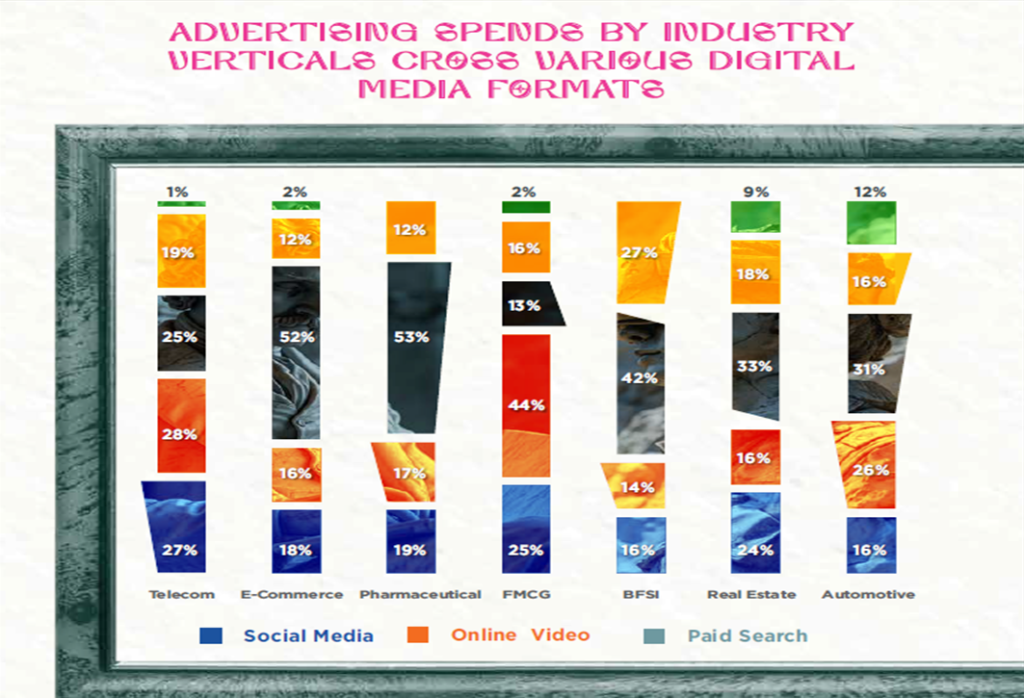
The report further stated that spends on digital media has surpassed that of television, comprising 44% of all advertising spends, followed by television at 32%, and print media at 20%. FMCG leads with a 34% share (Rs 31,428 crore), followed by e-commerce (14%), consumer durables (6%), and automotive sectors (6%).
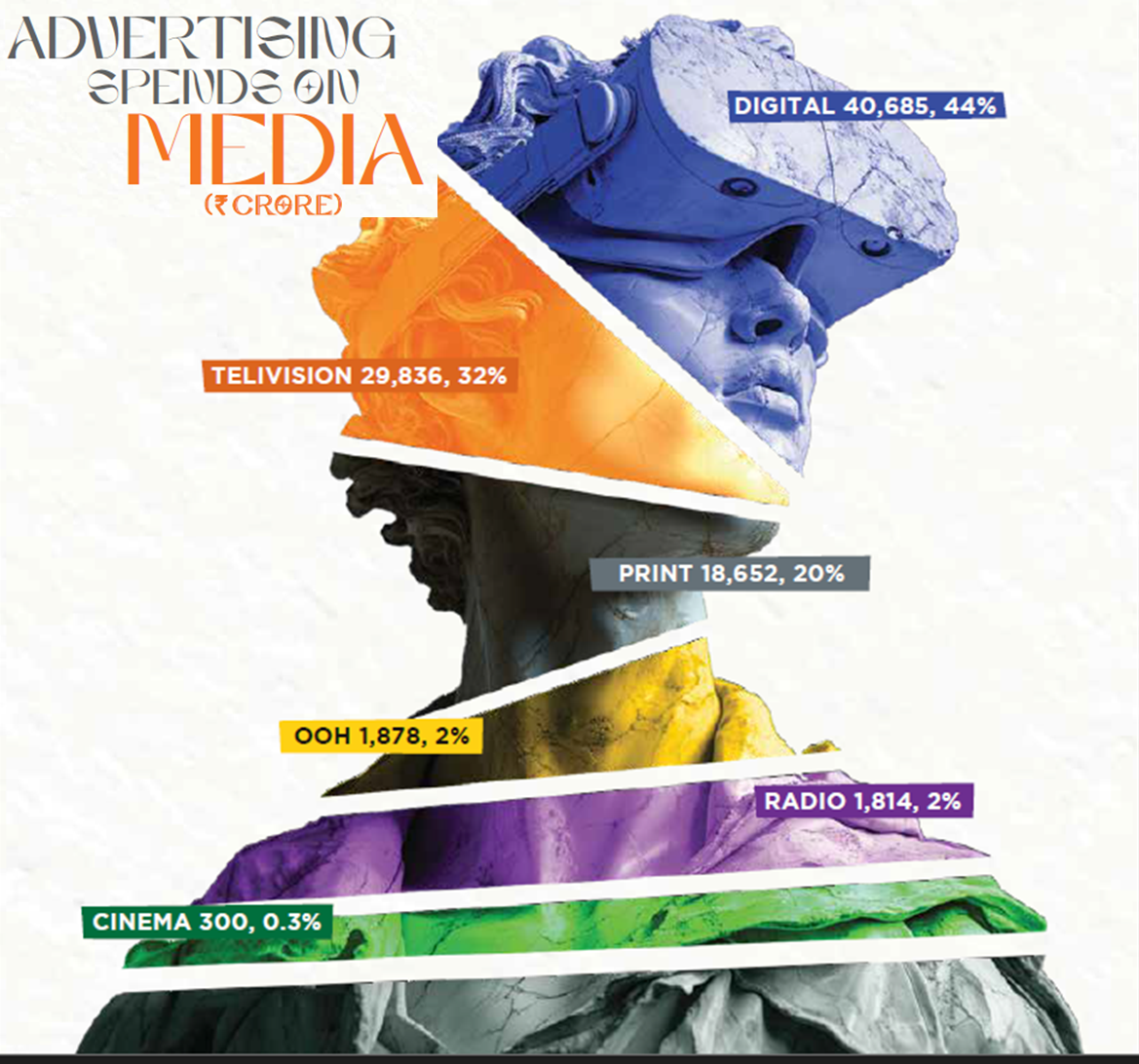
“Digital media has surpassed television, securing the largest advertising spends share of 44%, followed by television (32%) and print media (20%). By the end of 2024, digital media is anticipated to contribute half of the total advertising spends. Meanwhile, FMCG segment divides 94% of its media budgets equally between digital and television”, the report added.
Social media is the primary driver of digital media spends at 30%, followed by online video at 29% and paid search at 23%. Online video and social media experience the fastest growth among digital media formats. Programmatic buying of digital media has gained prominence, contributing 42% (Rs 17,088 crore) to the digital media industry by the end of 2023, growing at a rate of 37% over the previous year.
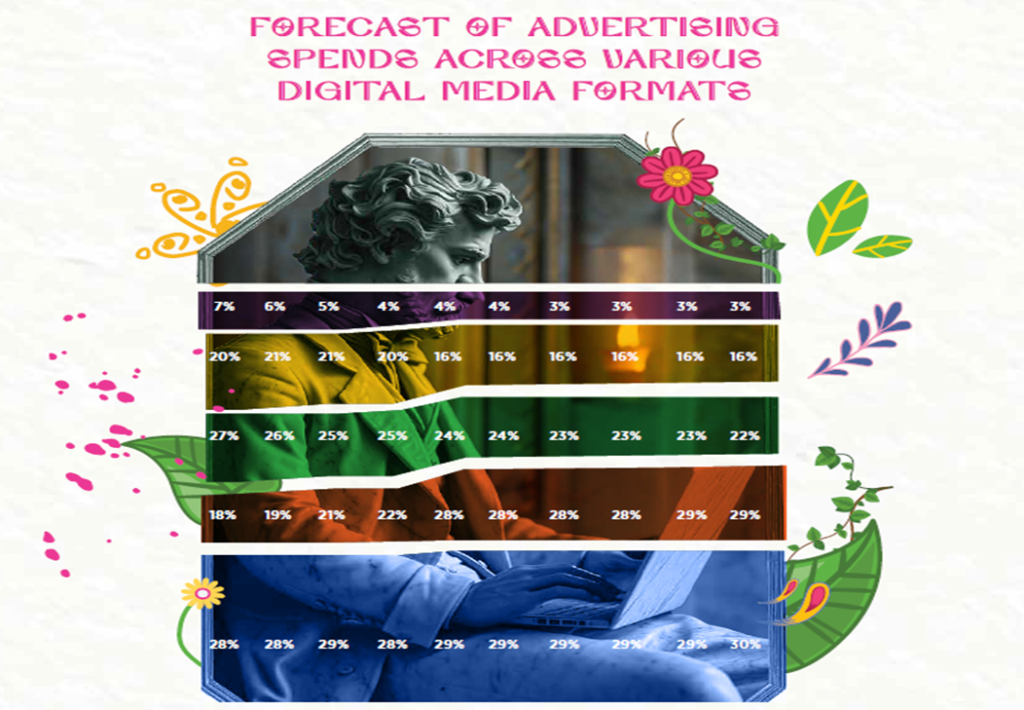
“Social media dominates digital media spends, contributing with a 30% share (Rs. 11,962 cr), closely followed by online video with 29% and paid search with 23%. The telecom sector allocates the highest proportion of its media budget towards digital (64%). Within digital media, telecom evenly distributes around 80% of their digital budget across online video, social media and paid search. E-commerce segment dedicates 61% of the overall media budget to digital media with 52% of that allocated to paid search”, the report said.
Harsha Razdan, CEO South Asia, dentsu, said, “India’s digital revolution is more than a surge of numbers; it’s a wave of change that is sweeping across our lives, our industries, and our society. Artificial intelligence is the driving force behind this change, enabling our e-commerce market to reach $200 billion by 2026. But as we embrace this AI-powered era, we must also redefine our vision of success. It’s not enough to aim for financial growth; we must also strive for social good. We must be human in the face of technology—empathetic, creative, and courageous—shaping the future of Indian advertising with transparency, accountability, and ethics. The dentsu e4m Digital report 2024 is not just a snapshot; it’s a call to action to join us in creating a future that is ours to shape”.
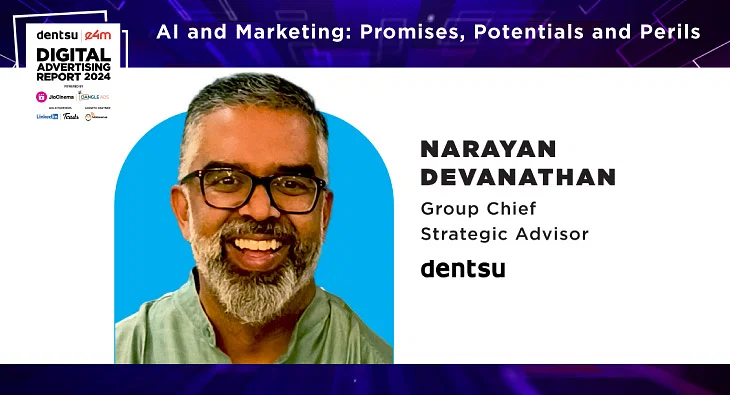
Narayan Devanathan, Group Chief Strategic Advisor, dentsu India, said, “The dentsu e4m Digital report is a testament to our commitment to providing our clients with the best-in-class solutions and insights that help them navigate the dynamic and complex media landscape. We believe that digital media is not just a medium, but a mindset that drives innovation and creativity across all platforms and formats. The report showcases how digital media has become the dominant force in the industry, surpassing television and influencing other media as well. It also reveals the potential of emerging sectors, trends, and technologies that will shape the future of advertising and consumer engagement. We are confident that this report will serve as a valuable resource for advertisers, media owners, and industry stakeholders, as well as inspire them to embrace the opportunities and challenges that lie ahead”.
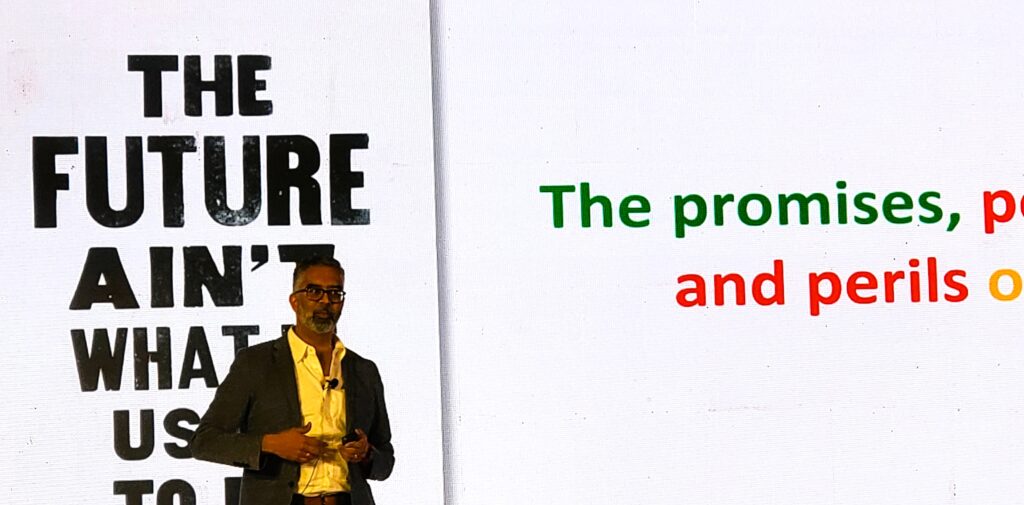
Narayan Devanathan, Group Chief Strategic Advisor, dentsu India, spoke at the introduction of the dentsu-e4m Digital Advertising Report about the complexity of AI and sustainability in marketing, emphasising, “Avoid getting caught up in the hype of AI, focus on its potential.”
“With AI, we have a technology that could impact every aspect of humanity, akin to the invention of the internet. We face a choice: to harness its capabilities for the betterment of the world or succumb to primal instincts,” he said.
He emphasised the critical need to focus on sustainability in marketing, saying, “While this topic was given to me, I conveniently deleted the words “in marketing” because we’re good at ignoring briefs most of the time.” But let’s connect the dots: society is a vital and critical stakeholder in everything we do going forward. It comes back to something that has been a comfortable motto for all of us in business for the past decade: “Do well by doing good.”
“In the perspective of sustainability, simply doing good is no longer enough. We have to do it correctly. That is a far more difficult prospect, since the leader revealed his vision.
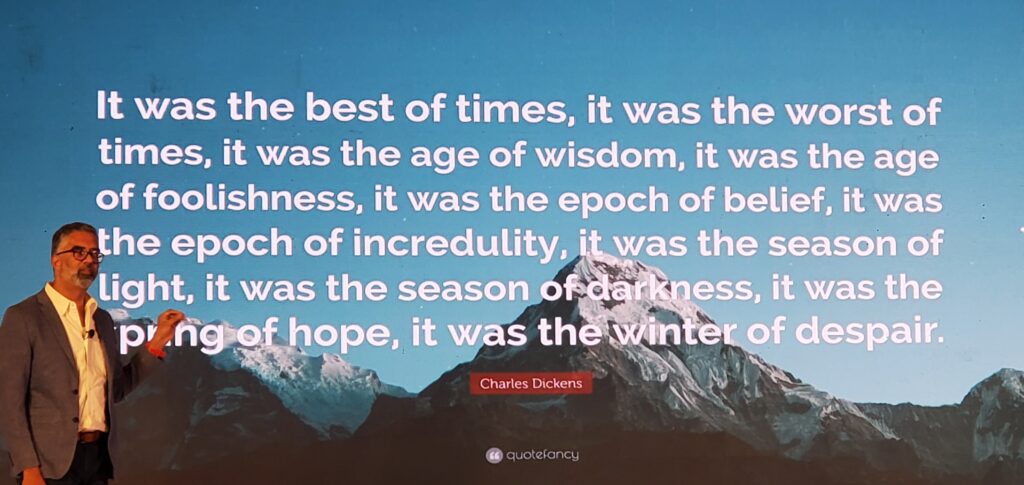
Referring to a Charles Dickens remark, Devanathan stated, “The quote is from the middle of the 1800s and comes from the opening lines of the book “Tale of Two Cities,” and it appears so contradictory, so oxymoronic when you read all of the sentences. However, it also appears to be quite current. It appears like he might have written this today. It might have been written about tomorrow, too. And it raises the question of what it is actually. Is now the best of times? Is this the worst of times? Is it time to wonder? Is now the time for despair? And the answer is yes, since it encompasses all of the above. But what it becomes is entirely up to us.”
He went on to say, “Some of you may be aware with this metaphor for how technology has advanced through our society, particularly over the last 40 years or so. There’s something known as the pinnacle of exaggerated expectations. We’ve seen this with virtual reality, the metaverse, and other technologies. However, many technologies have quickly fallen from the pinnacle of inflated expectations to the trough of disillusionment because they have failed to deliver on their promises.
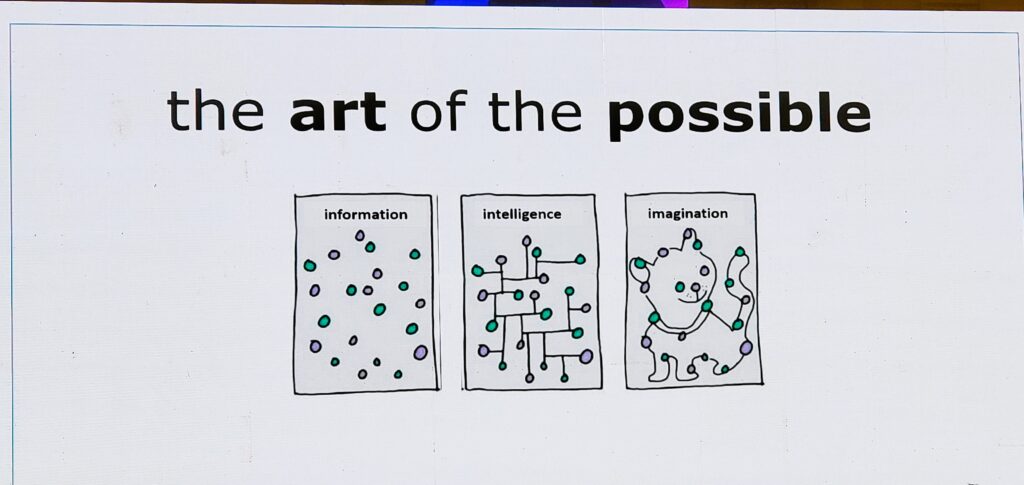
Further in his talk, Narayan Devanathan said: “So far, at least, artificial intelligence is still no match for human stupidity. The dumb things that we are capable of as humans are because our scales of intelligence vary so much. Machines are still learning from us. Some movies like ‘Robot’ and ‘Her’ showcase the intersection of the worst of human biology and chemistry – when a human falls in love with a robot. So, we’re still plumbing the depths of human stupidity. Machines have a long way to go. Or do they? Because we’ve experimented with this. We’ve seen how machines are catching up to our levels of stupidity.”
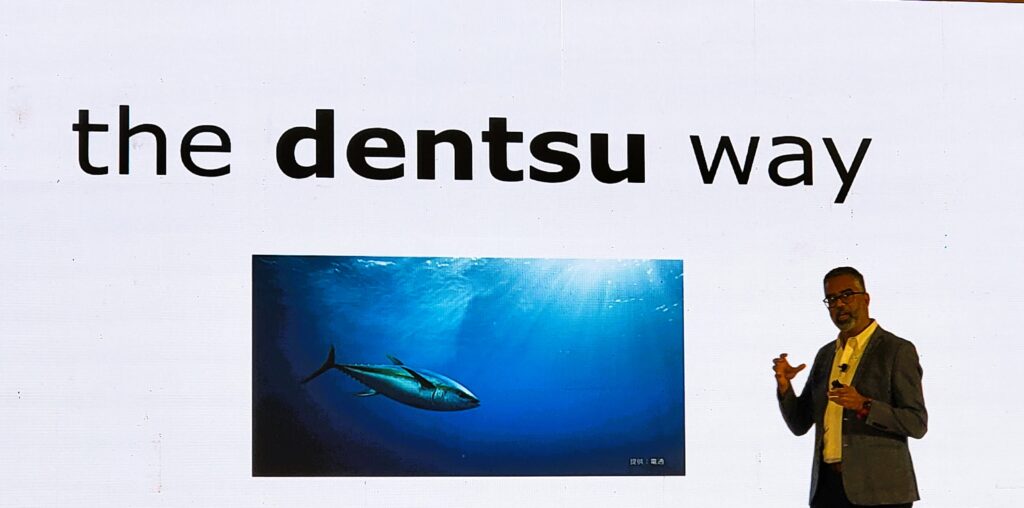
“But actually, that’s not the main story. The main story, as so vividly demonstrated, was we’ll never have to be threatened by machines because AI is never going to stand for artificial imagination. It’s artificial intelligence and imagination will always be a human domain,” he noted
“And that’s why the potential and the promises will always outweigh what we can do. The future can be whatever we want it to be, and it’s our responsibility as much as the opportunity to shape it,” Devanathan urges.

